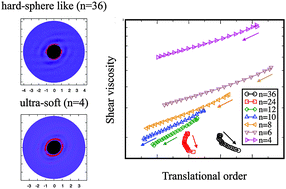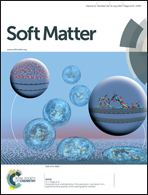Equilibrium and nonequilibrium dynamics of soft sphere fluids†
Abstract
We use computer simulations to test the freezing-point scaling relationship between equilibrium transport coefficients (self-diffusivity, viscosity) and thermodynamic parameters for soft sphere fluids. The fluid particles interact via the inverse-power potential (IPP), and the particle softness is changed by modifying the exponent of the distance-dependent potential term. In the case of IPP fluids, density and temperature are not independent variables and can be combined to obtain a coupling parameter to define the thermodynamic state of the system. We find that the rescaled coupling parameter, based on its value at the freezing point, can approximately collapse the diffusivity and viscosity data for IPP fluids over a wide range of particle softness. Even though the collapse is far from perfect, the freezing-point scaling relationship provides a convenient and effective way to compare the structure and dynamics of fluid systems with different particle softness. We further show that an alternate scaling relationship based on two-body excess entropy can provide an almost perfect collapse of the diffusivity and viscosity data below the freezing transition. Next, we perform nonequilibrium molecular dynamics simulations to calculate the shear-dependent viscosity and to identify the distinct role of particle softness in underlying structural changes associated with rheological properties. Qualitatively, we find a similar shear-thinning behavior for IPP fluids with different particle softness, though softer particles exhibit stronger shear-thinning tendency. By investigating the distance and angle-dependent pair correlation functions in these systems, we find different structural features in the case of IPP fluids with hard-sphere like and softer particle interactions. Interestingly, shear-thinning in hard-sphere like fluids is accompanied by enhanced translational order, whereas softer fluids exhibit loss of order with shear. Our results provide a systematic evaluation of the role of particle softness in equilibrium and nonequilibrium transport properties and their underlying connection with thermodynamic and structural properties.


 Please wait while we load your content...
Please wait while we load your content...